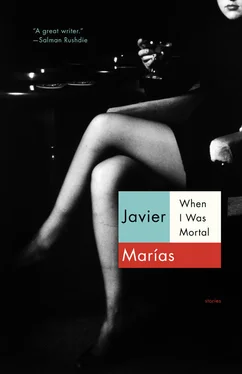I returned to my newspaper and a long time passed, too long, before either she or the republican doctor were once again framed in the doorway. Then I had the vague feeling that I was being nosy and it occurred to me that perhaps they were actually waiting for me to go to my room in order to come out and say goodbye. It also occurred to me that, immersed as I had been in reading an article about some sporting controversy, they might have quietly slipped out of the room without my noticing. Trying not to make any noise so as at least not to wake old Hélie, who would have been asleep for some time, I got up to go to bed. Before leaving the kitchen with my newspaper under my arm, I switched off the light, and that switching off of the light and my momentary stillness (the moment before taking a first step down the corridor) coincided with the reappearance in the doorway of the two figures, that of my friend Claudia and that of the night doctor. They paused on the threshold, and from my place in the darkness, I saw them peering in my direction, or so I thought. During that moment, what they saw was the extinguished kitchen light, and since I remained motionless, they probably assumed that I had gone off to my room without their noticing. If I allowed them to believe such a thing, if I, in fact, remained there motionless after seeing them, it was because the doctor, again standing against the light, once more raised the syringe in his left hand, and Claudia, in her nightdress and dressing gown, was clinging onto his other arm as if to instil him with courage by her touch or else restore his composure by her breathing. Thus, arm in arm, bound together by what was about to happen, they moved out of the children’s room, and I lost sight of them, but I heard the door of the master bedroom opening, the bedroom in which Hélie would be sleeping, and I heard it close. I thought that perhaps, immediately after that, I would hear the doctor’s footsteps, he having left Claudia in her room in order to leave the house, now that his medical mission had been fulfilled. But that isn’t what happened, the penultimate thing I heard that night was the closing of the master bedroom door, which the night doctor had also entered, very quietly and holding a syringe in his left hand.
With great care (I took off my shoes), I walked down the corridor to my room. I undressed, got into bed and finished reading the newspaper. Before turning out the light, I waited a few seconds and it was in those brief seconds of waiting that I at last heard the front door and Claudia’s voice saying goodbye to the doctor in Spanish: “See you in a fortnight then. Goodnight, and thanks.” The truth is that I still felt like speaking a little more of my own language on that night on which I had twice missed the opportunity of doing so with my compatriot the doctor.
I was going back to Madrid the following morning. Before leaving, I had time to ask Claudia how she was, and she said she was fine, that the pains had gone. Hélie, on the other hand, was indisposed after the various excesses of the previous night and said he was sorry not to be able to say goodbye to me himself.
I spoke to him on the phone after that (that is, he picked up the phone on one occasion when I called Claudia from Madrid in the months that followed), but the last time I saw him was when I left his apartment that night, after the supper for seven, to walk the Italian friend, whose name I cannot remember, back to her apartment. Precisely because I cannot remember her name, I do not know if the next time I go to Paris, I will dare to ask Claudia how she is, because now that Hélie is dead, I wouldn’t want to run the risk of finding out that perhaps she too has become a widow since my departure.
Lo stesso
I HAVE TWO Italian women friends, who both live in Paris. Until a couple of years ago, they had never met, they had never seen each other, I introduced them one summer, I was the link and I’m afraid to say I still am, although they have not seen each other since. From the time that they met, or rather, saw each other and became aware that I knew both of them, their lives have changed far too rapidly and not so much in parallel as consecutively. I don’t know if I should stop seeing the one in order to liberate the other, or change the nature of my relationship with the other in order to have the first one disappear from her life. I don’t know what to do, I don’t know if I should say anything.
Initially, they had nothing in common, apart from a considerable mutual interest in books and, therefore, their respective libraries, each created with patience, devotion and care. The friend I had known longest, Giulia, was an amateur: the daughter of a former ambassador, a misino (i.e a neo-fascist), she was married and had two children, she rented out a few apartments that she owned in Rome, she lived off the rent and did not work, she could devote almost all her time to her passion, reading, and her social life was limited to inviting writers to her house in a pale emulation of French salonnières of the eighteenth century such as Madame du Deffand (what more can one expect nowadays?). My more recent friend, Silvia, on the other hand, was a professional: she edited a series for a publisher, she was slightly younger, single, with no assets, and she scraped a living writing for Italian newspapers — interviews and articles on books; she didn’t invite anyone to her house, but instead went out and met writers in cafés, in cinemas, sometimes for supper. As for me, despite being a foreigner to them and a foreigner in the city, Silvia would meet me somewhere and Giulia would invite me home. When Giulia invited me home, her husband used to go out for a few hours because he hated all things Spanish. He was an older man, twenty years older than his wife, and a writer himself (albeit of treatises on engineering), in possession of a precarious fortune of which Giulia made only moderate use. Then one summer, her husband had to go away for a considerable period, for professional reasons. From the kitchen window, Giulia began to notice a young man who lived a few floors below. She always saw him sitting down, with his glasses on, but without his shirt, apparently studying. Later, they passed on the stairs, and by the time her husband returned they had become lovers, they would leave letters in each other’s mail boxes, with no return address on the back. Only a month later, her husband asked for a divorce and left the apartment. The neighbour came and went up and down the stairs.
It was then that my other friend, Silvia, announced to me that she was getting married. One of those older writers with whom she used to go out to the café or to the cinema had become so much a part of her life that she couldn’t do without him. He was twenty years older than her, very intelligent (she said), he wrote treatises on Islam, he had something of a reputation and a personal fortune inherited from his first wife, who had died ten years before. The only thing that alerted me then was the fact that, as Silvia laughingly told me, he hated all things Spanish, and so, when I visited Paris, she would perhaps have to continue meeting me in cafés and cinemas. It occurred to me that his hatred might have Moorish roots.
Meanwhile, Giulia, the first friend, devoted herself to leading the kind of life with the false student (his glasses made him look younger, he was a man of thirty-something, the same age as her, and had a good job as a psychologist with a big multinational) which, given his age and character, her husband had never wanted or been able to lead: not only in summer, like a large part of the world’s population, but during every vacation period, they set off on complicated journeys to far-away places: in the space of nine months they visited Bali, Malaysia and, finally, Thailand. It was in Thailand that, for no known reason, the psychologist or false student fell ill, and his case provoked such interest amongst the hospital doctors that even the Queen’s doctor dropped in to have a look at him. No one knew what he had, but after fifteen anxious days, he recovered and was able to return to Paris.
Читать дальше












